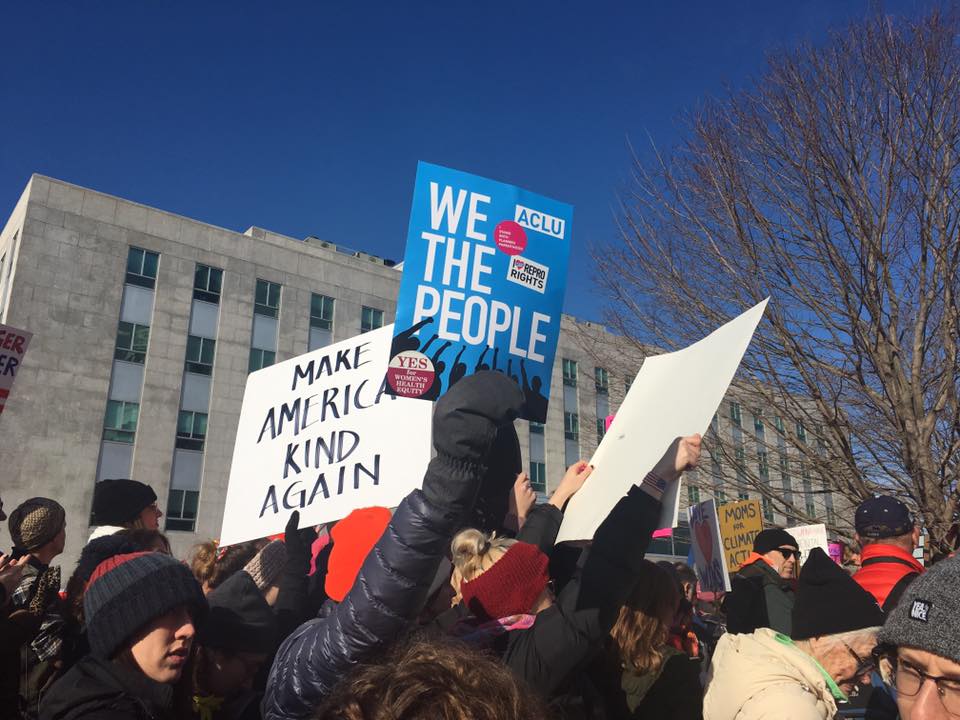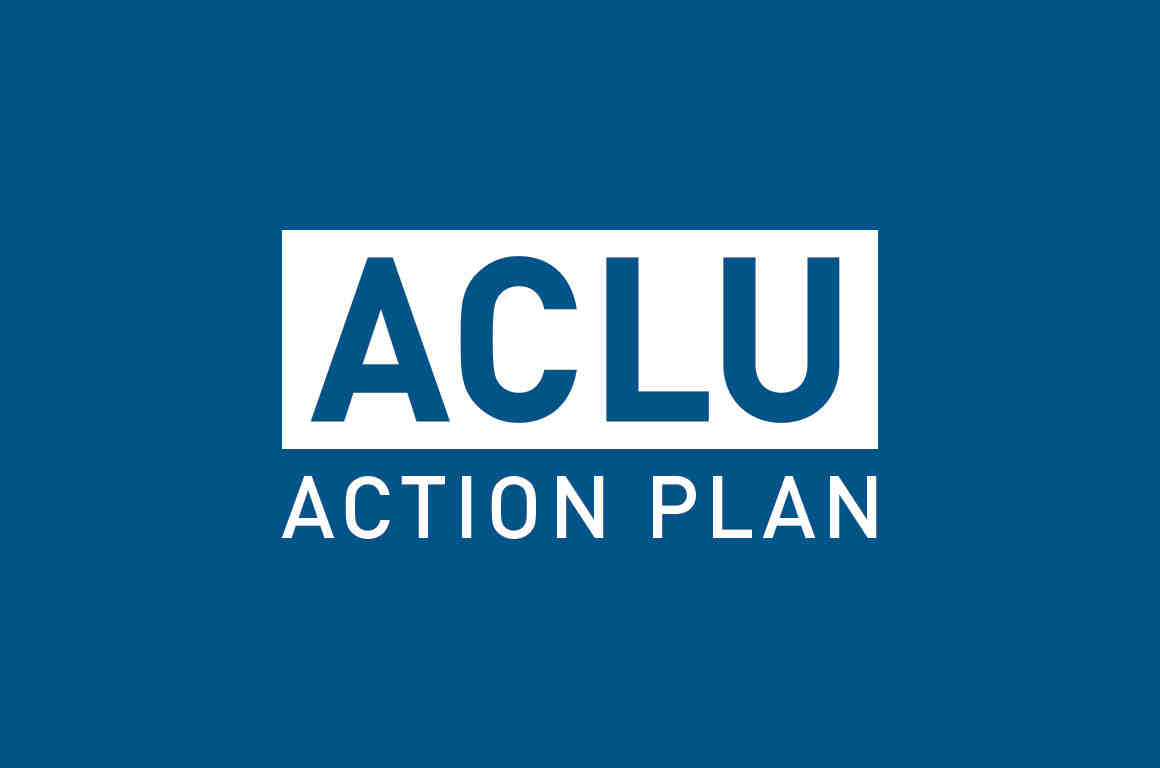By Stacy Sullivan, Associate Director of Strategic Communications, ACLU
Originally posted at aclu.org
As inauguration ceremonies commenced for President Trump, I was aboard the Amtrak 2117 from New York to Washington, D.C. Almost everyone on the train was female, and there was no need to ask anyone where they were going. The train was a river of pink pussy hats. Amy Schumer was in the next car over, with a running commentary on the inaugural, which a fellow passenger was streaming.
When we arrived in Washington’s Union Station, our pink hats met a smattering of red caps. Trump supporters, fresh from inaugural ceremonies, roamed the corridors in their trademark “Make America Great Again” hats.
To be sure, Friday, January 20, was theirs. But Saturday, January 21, would be ours.
Earlier in the week, the ACLU, one of 10 sponsors of the march, had sent 5,000 posters, 10,000 buttons, 1,000 sashes, and two 8-foot tall Statue of Liberty cutouts to an ACLU colleague’s house, which took up the better part of her living room.
Given the litany of civil liberties violations proposed by the Trump administration, there were any number of core ACLU messages we could have used — immigrants’ rights, women’s rights, LGBTQ rights, First Amendment rights, reproductive rights — but we settled on two that encompassed it all: “We the People” and “Dissent is Patriotic.” Our mission was to get the swag to the march and distribute it to the protesters.
On Friday evening, about 15 ACLU staffers and a dozen or so volunteers from across the country convened at my colleague’s house, and for several hours, we pinned sashes and stuffed bags with protest swag as we mapped out positions around the march and assigned volunteers to positions.
We tested our walkie-talkies — we rented them fearing cell service might not work — and assigned them to the volunteers. At some point, we sent a couple of people to Target to buy rubber bands, more bags, twine to tie up posters, and packing tape. Sometime after 9 p.m., we loaded it all into the nine-passenger van we rented earlier in the day. When it didn’t all fit, we summoned two back-up cars.
Then we all dispersed to our various friends’ couches (guestrooms, if we got lucky) and met up again at 5 a.m. at our assigned positions. I was at our makeshift headquarters, a conference room at the Hotel George at E and First St., N.W. From there, we took turns running supplies of posters and swag bags to volunteers in Lower Senate Park, and from there, to several distribution points around metro stations and streets leading to the march.
By 6:30 a.m., our positions were swarming with marchers, eager for buttons and signs. Some were young, little girls who had come with their mothers. Some were old. There was an 83-year-old in a wheelchair. Some were local, from the District, but others had come from Ohio, Michigan, Vermont, and even California. All were united in opposition to the proposed policies of this administration.
By 7 a.m., we had run out of sashes. Requests came in over the walkie-talkies: “We are out of everything but signs at Independence and Fourth, over.”
“Copy that. We’re coming with more, over.”
Text messages came in: “We need more sashes.”
“We’re out of sashes.”
“Then bring buttons. All the buttons in the land!”
Our supplies disappeared as fast as we could get them to distribution points, in part because we wound up passing them out to people as we were en route.
By 9:30 a.m., we had run out of everything. I was stuck, along with three colleagues, in a crowd sandwiched between the Museum of the American Indian and the Mall, which had been fenced for the previous day’s ceremonies. We were crammed so tightly together that nobody could move.
For an hour, we stood there, a sea of pink pussy hats and a beautiful array of motley, homemade signs. “Viva la Vulva!” proclaimed one. “Love, Kindness, Respect,” read another. And there were many of our own, “We the People” and “Dissent is Patriotic.”
The chants took hold organically. “Say it loud, say it clear, refugees are welcome here,” one chant went. Then, “We need a leader, not a racist tweeter.” And then, “Black. Lives. Matter.” The crowd broke out into song, belting Woodie Guthrie’s, “This Land Is Your Land,” more than once.
We had planned for the many dozens of ACLU staffers and volunteers to meet up and march together as a contingent behind a banner, but the permitted space filled up so quickly that we found ourselves scattered in different locations and unable to move.
The walkie-talkies sputtered. “Attempting to join you at Constitution and Fourth, but unlikely. Unable to move, over.”
WhatsApp buzzed: “I’m stuck on Seventh and Independence, crowd is dangerously tight. Advise to stay back.”
“I have the banner but can’t get back to Fourth and independence.”
A text message came in from a friend at the march in New York. It was a photograph of marchers. “From river to river,” it read.
Word came that the actual march in D.C. had to be called off, because the route was too crowded. There was simply no room to march. Eventually, the march proceeded but not along the planned route.
It was only later in the day that we learned about the turnouts in Chicago and Los Angeles and that there were more than 500 marches across the United States and more than 100 international marches.
On Donald Trump’s first day in office, millions came together to send a message that we will not stand by silently if his administration threatened our freedoms. Taken together, the marches may have been the largest demonstration in U.S. history.
Not bad for day one. Stay tuned for more.
Date
Tuesday, January 24, 2017 - 9:30amFeatured image

